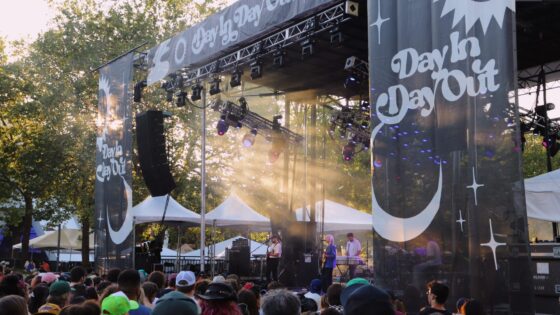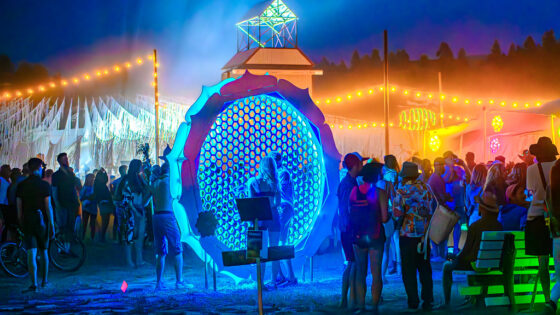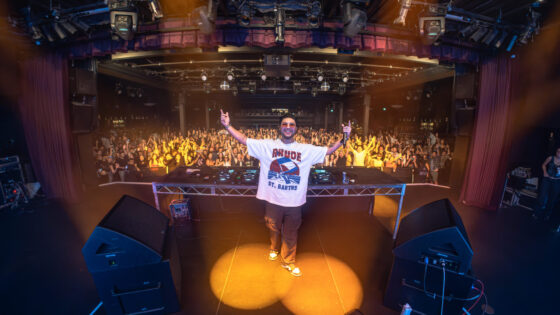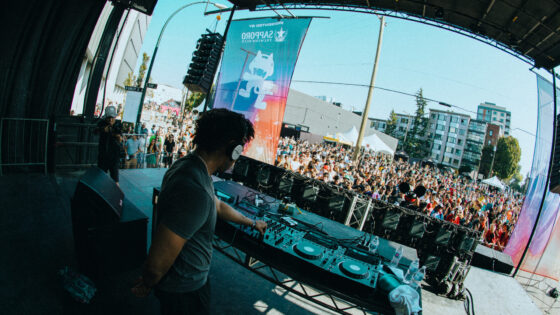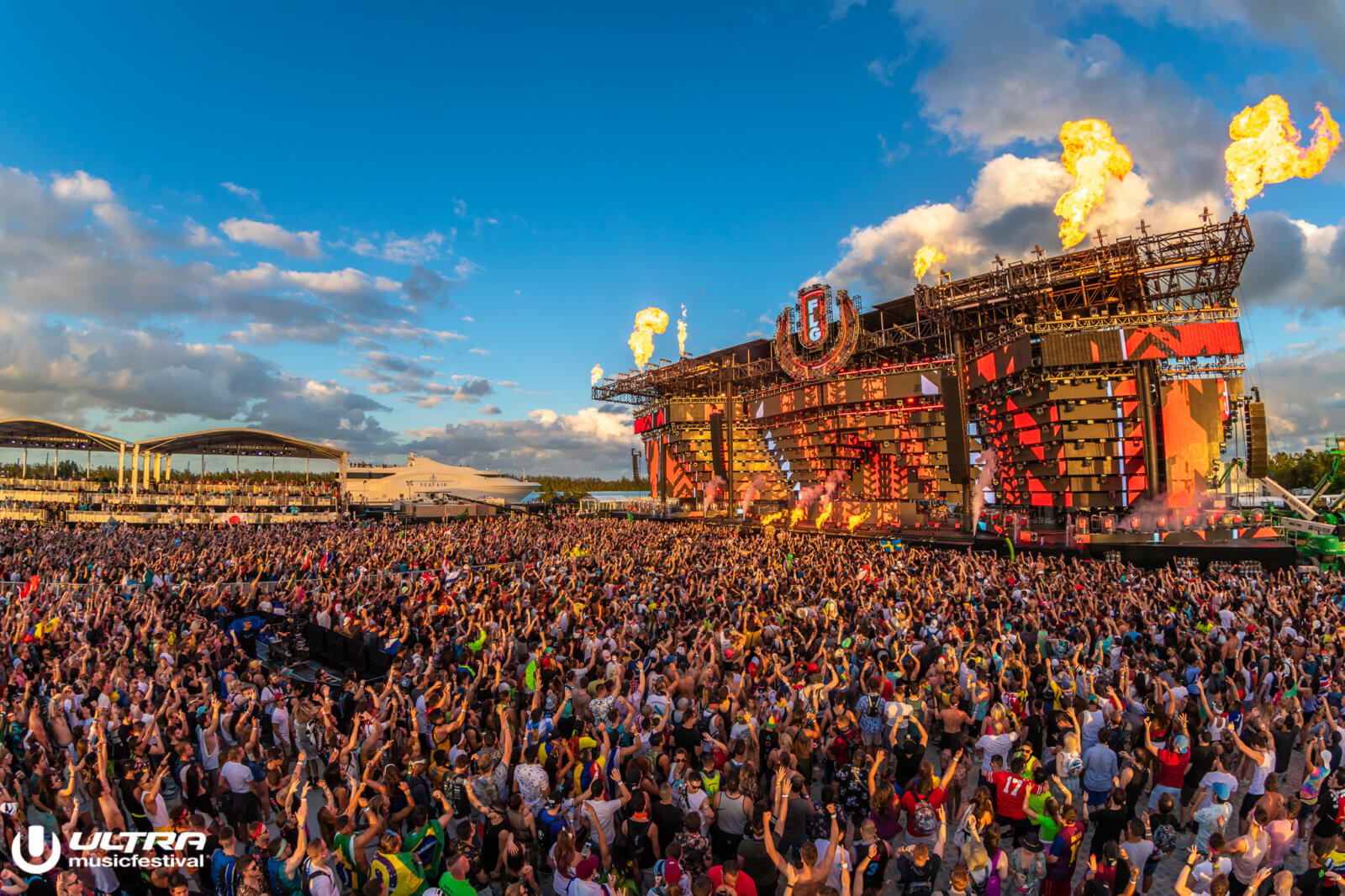When we think of climate change, we often conjure up images of big businesses spewing out alarming amounts of carbon dioxide, oil companies spilling oil into waterways, and melting polar ice caps. We don’t often think about how us as individuals may contribute to climate change and how our everyday hobbies might also play a role.
Think of the last event that you have attended. Maybe it was a festival or a club night — did you ever think about how that event might impact climate change? Have you ever thought about how to mitigate those impacts industry wide, or even individually? Whether you have or not, Massive Attack has.
The trio, comprised of members Robert “3D” Del Naja, Adrian “Tricky” Thaws, and Grant “Daddy G” Marshall formed in Bristol, England in the late 1980s, and for the past 20 years has been conscious about their carbon footprint and how those footprints contribute to climate change. Through carbon offsets, green energy, utilizing local resources, and public transportation, the trio has been a leader in the green revolution in the music industry.
In 2019, 3D commissioned a study to better understand how the music industry as a whole contributes to climate change and have used that research to call for more governmental regulation to help reach net zero carbon emissions or decarbonization.
Massive Attack partners with Tyndall Centre for climate change research
To better understand issues related to the music industry’s impact on climate change, Massive Attack partnered with a leading research organization in the field of climate change known as the Tyndall Centre. Using their own tour as a backdrop for examination, the Tyndall Centre was able to come up with solutions for mitigating climate change that goes beyond carbon offsets.
During Massive Attack’s 2019 tour, the Tyndall Centre examined everything from transportation, equipment, resources, food, staff, and local resources. This research is the first major look at how the music industry contributes to climate change, sparking the first real dialogue among industry leaders and governments worldwide.
The Tyndall Centre went beyond just the first phase of evaluating Massive Attack’s tour, also developing a roadmap for the wider live music sector to support delivery of emissions reductions in accordance with the UN Paris Climate Agreement, which seeks to reduce global warming by at least 2 degrees Celsius by eliminating carbon emissions to reach a net zero emissions system. Starting in 2024, countries who have adopted the Paris Climate Agreement will begin reporting how their work is going.
The Tyndall Centre recommendations for decarbonization in the music industry
Upon examining Massive Attack’s tour the Tyndall Centre published a paper with their findings along with their recommendations. Some of their key points include:
- Energy Use In Buildings: The first recommendation includes inside electricity use. The Tyndall Centre recommends holding venues accountable for their energy consumption and where possible setting a goal to cut emissions by 50% by 2025. A major way this can be accomplished is for venues to switch to natural gas instead of using fossil fuels as their energy source.
- Energy Use Outside: Most outdoor festivals rely on diesel powered generators to run equipment and lighting. The Tyndall Centre recommends adopting more sustainable fuel models where generators could run on biofuels with little to no emissions.
- Surface Travel: Getting staff and talent from point A to point B is not only challenging and costly, it is one of the main contributors to climate change. The Tyndall Centre recommends utilizing transportation alternatives that do not contribute emissions such as using electric vehicles, trains, and when possible using video conferencing when in-person meetings need to happen to eliminate the need for excessive travelling.
- Air Travel: This method of travel is another main contributor to climate change. The demanding tour schedules many artists face can be prepared better to help reduce emissions by at 20% by 2025. To do this, the Tyndall Centre recommends the music industry begins supporting low carbon air travel modes as well as reducing their tour schedules or scheduling their tours in a way that will reduce their time in the air.
These are just some of the contributions the Tyndall Centre has made as part of their research, and does not comprise of all of the recommendations they have put forth thus far. To read all of their recommendations you may do so here.
Why carbon offsets aren’t enough
Carbon offsets are a simple solution for a not-so-simple problem. At their core they help balance out the amount of carbon emissions every year through green energy programs that seek to address the issues of pollution. Some examples of carbon offsets include planting trees that absorb carbon dioxide and emit clean oxygen; implementing green energy where possible such as wind, solar, and geothermal; and capping how much fossil fuel is used every year.
Massive Attack have been utilizing many carbon offsets to help reduce their footprint over the course of the last 20 years. They have been devoted to donating proceeds from their shows to planting trees. They also travel via train (instead of flying, which is a top-five contributor to carbon emissions worldwide) whenever possible, and they use local materials to help build sets to eliminate the need for shipping. They also bring the least amount of equipment possible to reduce the amount of electricity they use.
While carbon offsets have been implemented by every country over the last 10 to 15 years, they also don’t go far enough to help reduce climate change on their own. This is because carbon offsets are completely voluntary, countries and corporations are not required to participate or adopt carbon offset programs.
Since they are widely unregulated, industries such as the entertainment sectors continue on without considering what they can do to help bridge the gap that carbon offsets cause. That is why Massive Attack commissioned this research project, as a way to address the music industry’s seemingly blatant disregard for all things climate change. They are using the research to spark a debate with local and global governments in the hope that lasting legislation and rules can be adopted that become the industry standard.
Impacts from the Pacific Northwest music scene
We may not be a large music scene like Las Vegas, Miami, or even Europe, but we are from a part of the nation that has been leading in the fight against climate change for years. Some of the recommendations from the Tyndall Centre aren’t just meant for show in the UK, but across the entire world. These are practices that we can implement right here, in our own neck of the woods.
We can once again be the beacon of change that so many people from the rest of the country have become accustomed to. Our clubs are small, our festivals are small, but we have big hearts and an even bigger passion for our music scene. The next time you attend a club night or a festival you just might be helping the climate change cause, because every little bit helps.
While everything must start at the individual level, it’s imperative that industries also have a role to play in reducing climate change. Many musicians and DJs have followed in Massive Attack’s footsteps, moving toward greener tours using sustainable energy and carbon offsets, but there still aren’t overarching rules or laws to help regulate this.
Massive Attack has laid the ground work, the Tyndall Centre cemented that framework with their research and all that’s left is implementation both on a personal and industry level. Hold your governments accountable, but hold each other accountable as well. If we all pitch in we can all make a difference together. That’s what Massive Attack would want us to do.
Important things happen in Pacific Northwest nightlife, and DMNW will send you alerts!










